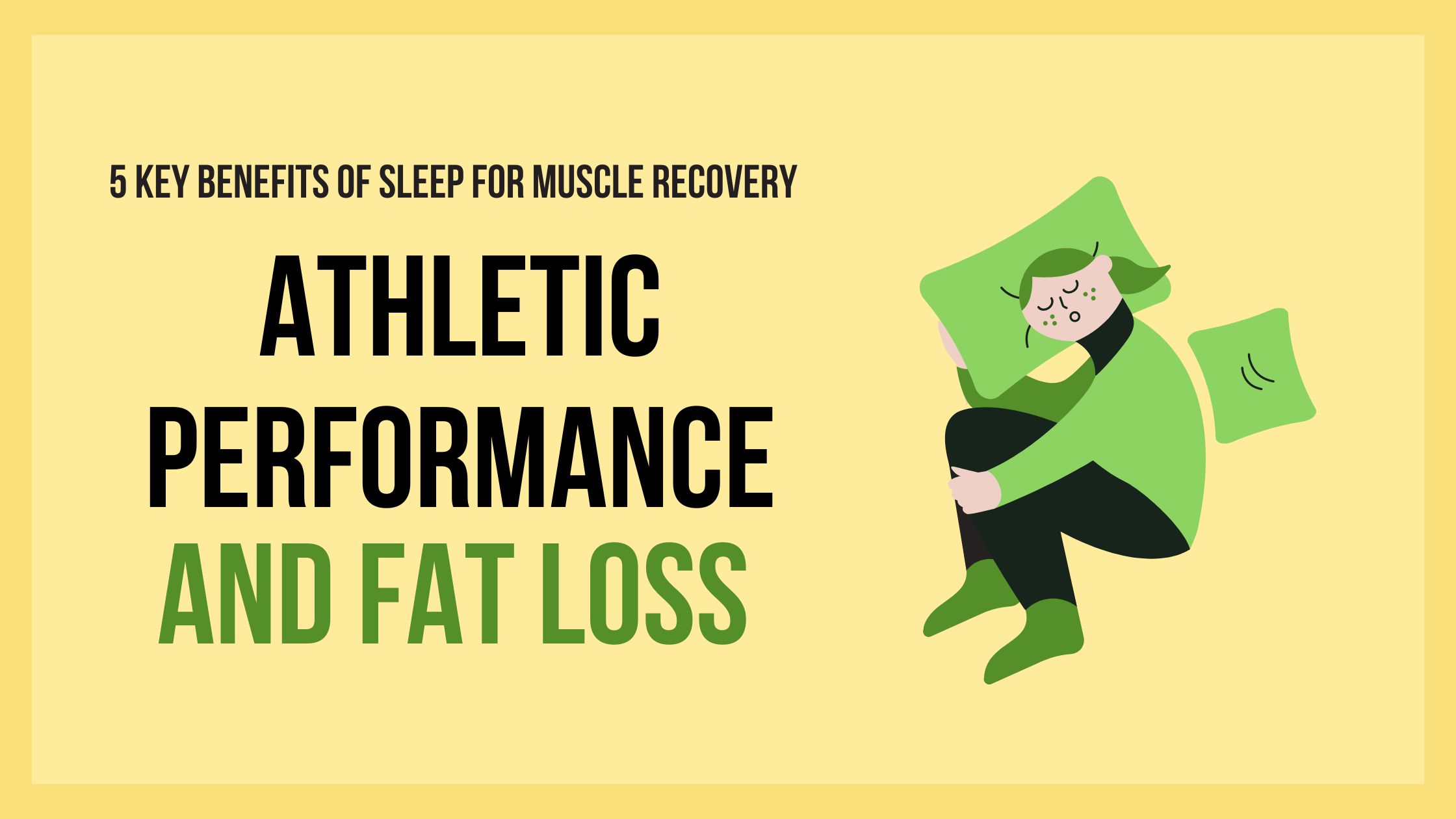Introduction:-
5 Key Benefits of Sleep for Muscle Recovery, Athletic Performance, and Fat Loss

In the pursuit of fitness, many people focus on diet and exercise but often overlook a critical factor for success: sleep. Proper sleep is just as essential as a balanced diet and consistent workouts when it comes to muscle recovery, athletic performance, and fat loss. In this article, we’ll explore the five key benefits of sleep that can help elevate your fitness journey.
The 5 key benefits of sleep that can help elevate your fitness journey
1.Improved Muscle Recovery
While you sleep, your body shifts into a repair mode crucial for muscle recovery. During deep sleep, or slow-wave sleep, growth hormone levels reach their highest point, facilitating the repair and rebuilding of muscle tissues. This process speeds up recovery following intense workouts, reduces soreness, and promotes muscle growth.
Conversely, insufficient sleep can impede recovery, resulting in prolonged muscle soreness and a heightened risk of injury. To optimize muscle recovery, strive for 7-9 hours of quality sleep each night.
2.Improved Athletic Performance
The quality of your sleep is closely linked to athletic performance. Research indicates that well-rested athletes demonstrate better reaction times, accuracy, and endurance compared to those who are lacking sleep. Whether you’re training for a marathon, lifting weights, or engaging in sports, your body needs adequate rest to perform optimally.
Sleep also enhances cognitive abilities such as focus, decision-making, and problem-solving, all of which are crucial for peak performance in any sport. By prioritizing sleep, you can elevate your energy levels, enhance your performance, and achieve superior results in your workouts.
3.Increased Fat Loss
If fat loss is your aim, prioritizing sleep is essential. Sleep deprivation can disrupt hormonal balance, particularly affecting hormones like ghrelin (which stimulates appetite) and leptin (which signals fullness). When you don’t get enough sleep, your body tends to produce more ghrelin and less leptin, leading to increased hunger and potential overeating.
Moreover, inadequate sleep can raise cortisol levels, a stress hormone that promotes fat storage, particularly in the abdominal area. Ensuring sufficient sleep helps regulate these hormones, making it easier to maintain a healthy calorie balance and support fat loss initiatives.
4.Better Muscle Growth
Sleep is vital for muscle protein synthesis, the process through which your body repairs and builds new muscle tissue. During deep sleep, protein synthesis occurs at an elevated rate, promoting muscle growth following resistance training or intense exercise. Without adequate sleep, your body may struggle to effectively build muscle, regardless of how hard you train.
By ensuring you get enough sleep, you not only recover more quickly but also maximize muscle growth, enabling greater progress toward your fitness objectives.
5.Reduced Risk of Injury
An often overlooked benefit of sleep is its role in minimizing the risk of injury. Sleep deprivation can impair your coordination, balance, and motor skills, increasing your vulnerability to accidents during physical activities. Additionally, insufficient sleep can result in heightened muscle fatigue, which may lead to poor form and overexertion during workouts.
By making sleep a priority, you’ll enhance your physical abilities and lower the chances of injury, allowing you to maintain consistency in your training regimen.
What are the risks of working out with insufficient sleep?
Working out with insufficient sleep can lead to a variety of risks that impact both your physical performance and overall health. Here are the key risks:

1. Decreased Performance
- Reduced Strength and Endurance: Lack of sleep affects muscle strength, endurance, and overall stamina. Your body can’t perform at its peak, making it harder to lift weights, run, or complete other forms of exercise.
- Slower Reaction Times: Sleep deprivation impairs coordination, balance, and reaction times, increasing the risk of injury, especially in high-intensity workouts or sports.
2. Increased Risk of Injury
- Impaired Focus and Judgment: Fatigue lowers concentration and makes you more prone to mistakes in form or technique, which can lead to sprains, strains, or other injuries.
- Slower Recovery: Sleep is essential for muscle repair and recovery. Inadequate sleep slows down the healing process, increasing the risk of chronic injuries and overtraining.
3. Weakened Immune System
- Decreased Immunity: Sleep is crucial for immune function. Exercising while sleep-deprived can suppress your immune system, making you more susceptible to illness and infections.
4. Hormonal Imbalance
- Impaired Muscle Growth: Sleep is when the body releases growth hormones necessary for muscle repair and development. Lack of sleep disrupts this process, limiting gains from strength training.
- Elevated Cortisol Levels: Insufficient sleep increases cortisol (a stress hormone), which can lead to muscle breakdown, fat storage, and increased stress levels.
5. Reduced Motivation and Mood
- Mental Fatigue: Lack of sleep reduces motivation to exercise, making workouts feel harder than they are. It also increases perceived exertion, making the same workout seem more challenging.
- Mood Swings: Sleep deprivation can lead to irritability, anxiety, or depression, which can negatively affect your attitude toward exercise and consistency in your routine.
6. Cardiovascular Stress
- Increased Heart Rate and Blood Pressure: Working out with little sleep can place added stress on the heart. Studies show that sleep deprivation may increase heart rate and blood pressure, putting undue strain on the cardiovascular system during exercise.
7. Compromised Cognitive Function
- Impaired Decision-Making: Fatigue hampers cognitive functions like decision-making and memory, which can affect complex workouts or new training techniques.
In summary, working out with insufficient sleep increases the risk of injury, weakens recovery, and impairs performance. It’s essential to prioritize sleep as part of your fitness routine for optimal results and overall health.
How much sleep do athletes need to perform optimally and how does sleep improve their muscle recovery?

Optimal Sleep for Athletes
Athletes generally need more sleep than the average person due to the physical and mental demands of their training. While 7-9 hours of sleep is recommended for the general population, elite athletes often need 8-10 hours per night to perform optimally. Some athletes even benefit from naps during the day to boost recovery and performance.
- Younger athletes, especially those in their teens, may require more sleep (9-11 hours) because they are still growing and recovering from both physical and mental exertion.
How Sleep Improves Muscle Recovery
- Hormonal Balance:
- Growth Hormone Release: During deep sleep, especially in the first half of the night (slow-wave sleep), the body releases the most growth hormone (GH). GH is essential for muscle repair, protein synthesis, and muscle growth. Without enough deep sleep, this critical process is disrupted, slowing muscle recovery and reducing gains from training.
- Testosterone: Sleep helps regulate testosterone production, a hormone crucial for muscle mass, strength, and recovery. Lower testosterone levels due to insufficient sleep impair an athlete’s ability to build muscle and recover from workouts.
- Protein Synthesis:
- During sleep, the body is in a fasting state, but it focuses on repairing tissues by using amino acids to build new proteins, which is vital for muscle repair after a strenuous workout. Proper sleep allows for optimal protein synthesis, which rebuilds and strengthens muscles that were broken down during exercise.
- Muscle Glycogen Restoration:
- Sleep aids in restoring glycogen levels, the stored form of carbohydrates in muscles, which is crucial for sustained energy during exercise. If sleep is inadequate, glycogen replenishment may be compromised, leading to reduced endurance and fatigue during subsequent workouts.
- Reduced Inflammation:
- Adequate sleep reduces the production of inflammatory markers like cytokines and promotes anti-inflammatory processes. This reduces overall inflammation in the body, helping to speed up muscle recovery and prevent injury.
- Cortisol Regulation:
- Sleep plays a crucial role in regulating cortisol levels. Cortisol, a stress hormone, naturally rises in the morning and falls at night. Insufficient sleep disrupts this rhythm, leading to elevated cortisol, which can lead to muscle breakdown and hinder recovery.
- Improved Muscle Coordination and Learning:
- Sleep, particularly REM sleep, helps consolidate motor skills and muscle memory. This means that sleep not only helps repair muscles physically but also enhances coordination and learning of new techniques, which is essential for skill-based sports.
Athletes require more sleep—typically 8-10 hours per night—for optimal performance. Sleep supports muscle recovery through hormonal regulation, protein synthesis, glycogen restoration, inflammation reduction, and improved motor coordination. Prioritizing sleep is crucial for faster recovery, reduced risk of injury, and sustained peak performance.
Conclusion
Sleep is a powerful tool that should not be overlooked in your fitness regimen. Whether your goal is muscle recovery, athletic performance, or fat loss, getting 7-9 hours of quality sleep each night will help you achieve your goals faster and more efficiently. Prioritizing sleep is one of the simplest yet most effective ways to enhance your fitness results and overall well-being.
By understanding the key benefits of sleep, you can unlock your full potential and take your health and performance to the next level.
References:
- Halson, S. L. (2014). Sleep in elite athletes and nutritional interventions to enhance sleep. European Journal of Sport Science, 14(sup1), S57-S69.
- Walker, M. P. (2009). The role of sleep in cognition and emotion. Annals of the New York Academy of Sciences, 1156(1), 168-197.
- Dattilo, M., Antunes, H. K., Medeiros, A., et al. (2011). Sleep and muscle recovery: Endocrinological and molecular basis for a new and promising hypothesis. Medical Hypotheses, 77(2), 220-222.

